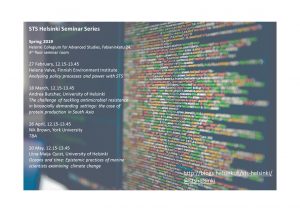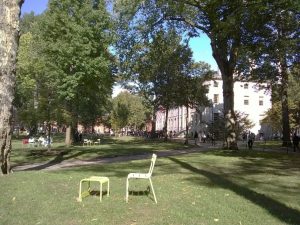Join us for the third session of the STS Helsinki Seminar Series on:
Friday, April 26th from 12.15-13.45
At: U35, Unioninkatu 35, seminar room 114. Note, we will be in a different location than usually!
Nik Brown, Professor of Sociology, University of York
Materialities of air care: a biopolitics of breath, buildings, bodies and bugs
This paper outlines an ‘aerography’ of respiratory life in the context of lung infection treatment by focussing conceptually and empirically on the embodiment and architectural materialisation of breath, breathing, air and atmosphere. It builds on an in-depth anthropology of three respiratory lung infection clinics treating patients with cystic fibrosis, a disorder characterised by life-long chronic respiratory infections, inflammation of the lungs. For most people with CF, breath and breathing are not to be taken for granted. Instead, respiration becomes an uncommon matter of conscious effort, determined resolve and atmospheric management. Here, the involuntary and implicit nature of breath is made explicit, surfacing above the taken-for-granted. To take an aerographic perspective is to attend more carefully to questions of air and atmosphere by challenging and reversing a sensorial hierarchy that privileges visibility, touch and solidity (Iragaray 1999). Any threat to breath and breathing is an ‘elemental’ source of abject dread and no more so than for the embodied lives of those for whom breath has become perilous (Williams 1989). Instead of an afterthought, an aerography asks ‘why not begin with air’ (Jackson and Fannin 2011), with the immaterially absent presence of the invisibly intangible? The question of air is, as Sloterdijk notes, a matter of sphereology, of being located and positioned ‘in’ some definite atmosphere or aerosphere. It prompts us to think about the nature of life enveloped ‘inside’ or encased in contrasting biospheres of relative exposure and protection, endangerment and safety (buildings, architectures, vehicles, rooms, households, neighbourhoods, air quality zones, worlds, hemispheres). Aerography prompts reflection on air’s movement, its ‘management’ or flow within ‘architectures of air currents’ (Wagenfeld 2008). In the context of infectious contagion, the air has become materially spatialised in physical sites of concern that call into question the biotic and ecological life of building design, layout and geometry (Kelley and Gilbert 2013). The biotic, and its capacity to select for resistance, newly refocuses attention on the mutually implicated microbiomes of buildings entangled with the microbiomes of bodies, respiratory tracts, nasal cavities, mucosal membranes, lungs, guts, hands and skin.
Nik Brown is professor in sociology at the University of York working across Science and Technology Studies (STS) and the Sociology of Health and Illness (SHI). He has several decades of research and scholarship experience working first on the regulation and governance of the biosciences. He has examined the political and moral economies of stem cell biobanks and umbilical cord blood banking. Nik’s most recent areas of interest include the biopolitics of infections and anti-microbial resistance (AMR). He has published widely on the biopolitics of immunity including a forthcoming monograph (‘Immunitary Life: The biopolitics of Immunity’, Palgrave-Macmillan, 2018).

